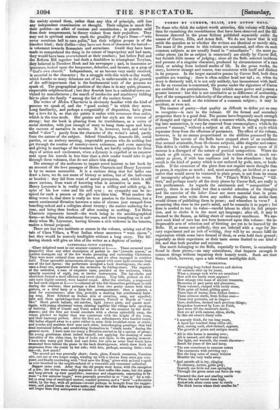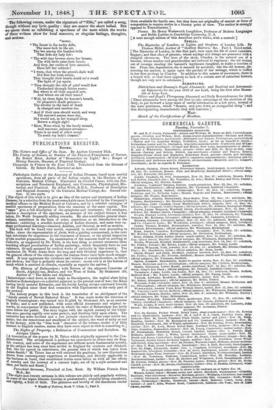POEMS BY CIIRREE, ELLIS ; AND ACTON BELL.
To those who think the subject worth attention, this volume will furnish data for examining the resemblances that have been observed and the dif- ferences detected in the prose fictions published separately under the names of Currer, Ellis, and Acton Bell. We do not know that it will settle the question as to whether the writers are identical or merely akin, The mass of the poems in this volume are occasional, and often on such common subjects as are usually found in " miscellanies" : the more pe.. culiar pieces (as far as subject is concerned) are chiefly by Currer but furnish little means of judging; since all the Bells selected incidents and persons of a singular character, produced by circumstances of a rare kind, or arising from isolated modes of life. In the prose works, the story, however strange and coarse, was consistent with itself and distinct in its purpose. In the larger narrative poems by Currer Bell, both these qualities are wanting : there is often neither head nor tail ; or, when the story is distinctly told, it is not only unlikely, but inconsistent with itself. As far as execution is concerned, the poems under the signature of Currer are entitled to the preEminence. They exhibit more power and possess a greater interest : but this is not conclusive as to difference of authorship. Part of the comparative inferiority of the others may arise from the greater quietness of a small or the triteness of a common subject; it may be accident, or even art.
The essence of poetry—that quality so difficult to define yet so easy to recognize—is rare in the volume. Of the formal and secondazq properties there is a good deal. The poems have frequently much strength of thought and vigour of diction, with a manner which, though degenerat- ing into mannerism, is very far removed from commonplace ; while in the poorest "stanzas," without a subject at all, Were is still a style which separates them from the effusions of poetasters. The effect of the volume, however, is by no means proportioned to the abilities possessed by the authors. The novels of the Bells have stopped short of an excellence that seemed attainable, from ill-chosen subjects, alike singular and coarse. This defect is visible enough in the poems ; but a greater cause of ill success is a disregard of the nature of poetical composition. Where the knack or gift exists, verse can possibly be written with as much cer- tainty as prose, if with less readiness and in less abundance : but the result is the kind of poetry which is not endured by gods, men, or book- stalls. If the structure of the piece does not require more thought than in prose, it requires as much ; and, most assuredly, an incident or a nar- rative that would never be ventured in plain prose, is not from its excess of incongruity adapted to verse. Yet "Pilate's Wife's Dream," "Gil- bert," and perhaps nearly all the story pieces by Currer Bell, are really in this predicament. As regards the sentiments and " composition" of poetry, there is ,no doubt but that a careful selection of the thoughts and the exercise of the labor lima are more essential than in prose. Few perpons who write down any sudden thoughts that strike them would dream of publishing them in prose ; and wherefore in verse ? A promising idea rises in the poet's mind, and he commits it to paper ; but time is needed to test its value—careful labour to elicit its full propor- tion, and to clothe it in the most apt language; after all, it may be doomed to the flames, as falling short of necessary excellence. We sus- pect such kind of care has not been bestowed upon this volume : the in- dispensable arts of selection and of blotting are yet to be learned by the Bells. If, as seems not unlikely, they are infected with a rage for lite- rary experiment and an itch of writing, they will by no means fulfil the expectation which some have formed of them, or even hold their ground; especially as their experience or their taste seems limited to one kind of life, and that both peculiar and extreme.
One merit belonging to the Bells, especially to Currer, is occasionally found in these pieces,—an easy naturalness, that imparts strength to common things without impairing their homely truth. Such are these lines; which, however, open a tale without intelligible drift.
"MEMENTOS.
"Arranging long-locked drawers and shelves Of cabinets shut up for years,
What a strange task we've set ourselves ! How still the lonely room appears! How strange this mass of ancient treasures, Mementos of past pains and pleasures; These volumes, clasped with costly stone, With print all faded, gilding gone; These fans of leaves, from Indian trees— These crimson shells, from Indian seas— These tiny portraits, set in rings— Once, doubtless, deemed such precious things; Keepsakes bestowed by Love on Faith, And worn till the receiver's death; Now stool with cameos, china, shells, In this old closet's dusty cells.
"I scarcely think, for ten long years, A hand has touched these relics old; And, coating each, slow-formed, appears, The growth of green and antique mould.
"All in this house is mussing over; All is unused, and dim and damp:
Nor light, nor warmth, the rooms discover—
Bereft for years of fire and lamp.
"The sun sometimes in summer enters The casements with reviving ray; But the long rains of many winters Moulder the very walls away.
"And outside all is ivy, clinging To chimney, lattice, gable grey; Scarcely one little red rose springing Through the green moss can force its way.
"Unscared the daw and starling nestle Where the tall turret rises high, And-winds alone come near to rustle The thick leaves where their cradles lie."
The following verses, under the signature of "Ellis," are called a song, though without any lyric quality : they are nearer the short ballad. But we quote them as exhibiting a specimen of the taste which the works of these writers show for local manners, or singular feelings, thoughts, and actions. "SONG.
"The Linnet in the rocky dells, The moor-lark in the air, The bee among the heather-bells That hide my lady fair: "The wild deer browse above her breast; The wild birds raise their brood; And they, her smiles of love caressed, Have left her solitude!
"I ween, that when the grave's dark wall Did first her form retain, They thought their hearts could ne'er recall The light of joy again.
" They thought the tide of grief would flow Unchecked through future years: But where is all their anguish now, And where are all their tears?
" Well, let them fight for honour's breath, Or pleasures shade pursue- The dweller in the land of death Is changed and careless too.
"And if their eyes should watch and weep Till sorrow's source were dry, She would not, in her tranquil sleep, Return a single sigh!
"Blow, West-wind, by the lonely mound, And murmur, summer-streams- There is no need of other sound To Booth my lady's dreams."



























 Previous page
Previous page